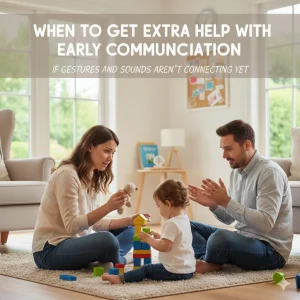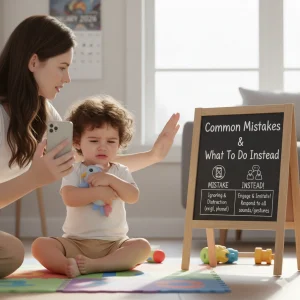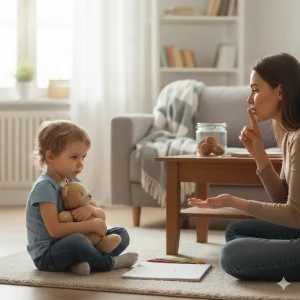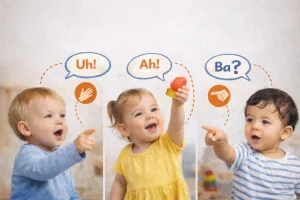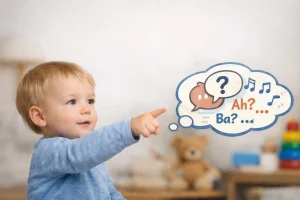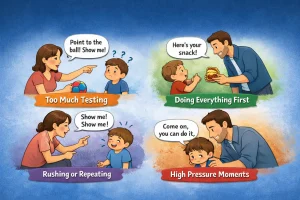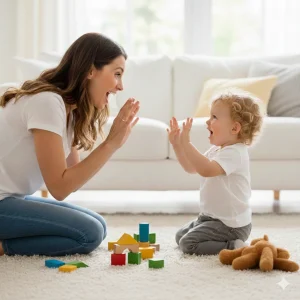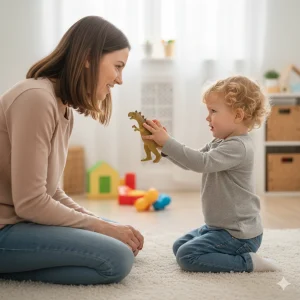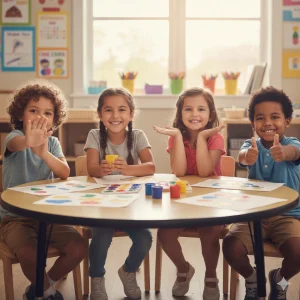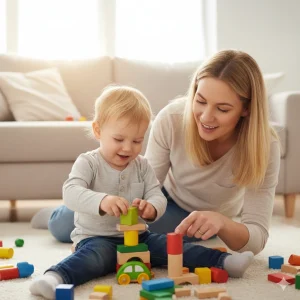Echolalia in Toddlers: Is It Normal or a Sign of a Speech Delay?
By Wellness Hub
Last Updated: July 11, 2025
Have you noticed your toddler repeating things you just said—sometimes right away, sometimes hours later? Maybe they echo phrases from cartoons or repeat questions instead of answering them. This kind of repeating is called echolalia, and while it can catch parents off guard, it’s actually more common than you might think.
Many toddlers go through a stage where they mimic speech as part of learning how to talk. Still, it’s natural to wonder: Is this just a phase, or something I should look into? If you’re asking that, you’re not alone. Lots of parents are in the same boat—watching closely, listening carefully, and hoping they’re doing the right thing.
Free Speech Help for Kids
Concerned about speech delays? Book a free consultation with our expert speech therapist and get guidance tailored to your child’s needs.
What is Echolalia in Toddlers?
You might be wondering, what is echolalia in toddlers? Simply put, echolalia means your child repeats words or phrases they’ve heard—either from you, someone else, or even the TV. It’s like their way of “echoing” what they hear as they figure out how speech works.
Let’s say you ask, “Do you want juice?” and your toddler responds by repeating, “Want juice?” instead of saying “Yes.” Or maybe they keep saying a favorite cartoon line over and over again. These are examples of echolalia—and they’re very common, especially between 18 months and 3 years.
There are two types you might notice:
- Immediate echolalia happens right after your child hears something.
For example, you say “Time for lunch,” and they immediately echo “Time for lunch.” - Delayed echolalia shows up later—sometimes hours or even days after they first heard the words.
Your toddler might randomly say a phrase from a story or a question they heard yesterday.
Is Echolalia Normal in Toddler Speech Development?
If you’ve been asking yourself, “Is echolalia normal in toddlers?” — you’re not alone. It’s one of the most common concerns parents bring up when their little one starts repeating words or phrases on loop.
The good news? In many cases, echolalia is a normal part of how toddlers learn to talk—especially between the ages of 1 and 3 years. During this time, children are soaking up everything they hear. Repeating words helps them practice sounds, understand patterns, and figure out how communication works.
Here’s a quick look at what’s typical:
- At 1–2 years, toddlers often echo simple words or phrases as they begin to form their own speech.
- By 2–3 years, they may repeat more complex phrases or full sentences, especially ones they hear often.
- Around age 3 and beyond, you should start to see more original speech. If your child is still mostly echoing without trying their own words, it might be worth looking deeper.
When to Worry About Echolalia: Signs of a Speech Delay
While many toddlers go through a phase of repeating words, you may still be wondering: Is this just a normal stage, or could it mean something more? Knowing the difference between harmless repetition and something that may need support can help you feel more confident as a parent.
Let’s talk about echolalia and speech delay—and how to spot when it’s time to look a little closer.
So, when is echolalia a concern?
Here are a few red flags to look out for:
- Your child repeats a lot but doesn’t use their own words to communicate
- There’s no clear progress in language over weeks or months
- Your toddler seems to use repetition instead of answering questions
- They repeat phrases that don’t fit the situation (like a cartoon line during dinner)
- You notice very limited eye contact or response when spoken to
- They show signs of frustration or withdrawal during communication attempts
These signs don’t automatically mean something is “wrong”—but they can point to a possible speech or language delay, or sometimes even early signs of autism spectrum disorder. That’s why it’s helpful to know what’s expected at your child’s age and when to ask for professional input.
Natural repetition vs. speech delay: What’s the difference?
It’s normal for toddlers to copy what they hear—that’s how they learn! But typically developing children begin to move past repetition and start forming their own sentences over time.
In contrast, a child with a speech delay may rely heavily on echolalia without showing signs of creative or spontaneous language. Instead of saying what they want, they might echo what they’ve heard—even when it doesn’t match the moment.
If your child is mostly repeating without trying to use their own voice, it may be time to get a little extra support.
Is Echolalia a Sign of Autism?
One of the biggest questions parents ask when their child starts repeating words is: Could this be autism? It’s a valid concern—and one that deserves clarity. Let’s break it down in simple terms.
Yes, echolalia can be one of the early signs seen in children with autism, especially if it continues beyond the typical toddler stage. In autism, echolalia may be more frequent, less flexible, and used in ways that don’t always fit the conversation. For example, a child might repeat phrases from a cartoon, not as a response, but just as a way to self-soothe or fill silence.
But here’s something important to remember: echolalia doesn’t automatically mean autism. Many toddlers repeat words as part of healthy speech development, and they grow out of it naturally as they build their own vocabulary.
So, how do you know if it might be more than just a phase?
Signs that may show up alongside echolalia in autism:
- Limited or no eye contact
- Trouble using gestures like pointing or waving
- Prefers to play alone or doesn’t seem interested in other kids
- Gets very focused on routines or objects
- Has trouble with changes or transitions
- Uses echolalia in a way that doesn’t connect to the situation
Also Read: Echolalia in Language Development: Strategies for ASD Support
How to Help a Toddler with Echolalia at Home
If you’re wondering how to help a toddler with echolalia in simple, everyday ways—good news: there’s a lot you can do right at home.
Echolalia can be a stepping stone in speech development, especially when guided gently. With the right kind of support, many children move from repeating words to using their own language. And the best part? You don’t need special tools—just your voice, your time, and a little patience.
Here are a few practical tips you can start using today:
1. Model the Right Sentences
Instead of correcting your child directly, show them how to say something in a natural way.
For example, if your toddler repeats, “Want juice?” after you ask them, you can say, “Yes, I want juice, please.” Over time, they’ll start to copy your phrasing and tone.
2. Slow Down Your Own Speech
Kids with echolalia are trying to process a lot at once. Speaking slowly gives them more time to understand what you’re saying—and how to respond. Keep sentences short and clear. Use pauses so your child has a chance to think and join in.
3. Give Them Time to Respond
Sometimes silence is golden. After asking a question or making a comment, wait. It may take a few extra seconds, but giving your child space to answer encourages them to try using their own words instead of echoing yours.
4. Encourage Talking Through Play
Play is one of the most natural ways children learn to speak. Use toys, pretend games, and picture books to spark interaction. Describe what you’re doing, label objects, and repeat fun phrases that match the activity.
Instead of “Say this,” try “Let’s say it together!”—it’s less pressure and more fun.
Helping your child move past repetition takes time, but small, consistent steps at home can lead to real progress. And if you ever feel unsure, it’s okay to get expert support along the way.
Speech Therapy for Echolalia and Delayed Speech
If your child is mostly repeating what they hear and struggling to use their own words, you might be wondering: Is it time to get professional help? That’s where speech therapy for echolalia can make a real difference.
Many toddlers go through phases where they echo words. But if that repetition continues without real progress—or if your child rarely initiates speech on their own—it may be a sign of a speech delay in toddlers.
When should you consult a speech-language pathologist?
Here are a few signs it might be time:
- Your toddler mostly repeats phrases but doesn’t use language to express needs or thoughts
- There’s little improvement in speech over a few months
- Your child uses the same repeated phrases in many situations
- You’re not seeing much two-way conversation, even in simple form
Conclusion
Many toddlers repeat words as they learn to talk. For some, echolalia is just a phase. But if your child is only echoing without using their own words, it’s okay to ask for help. Every child learns at their own pace, but early support can make speech easier and more natural. You don’t have to wait and see—trust your gut. Start early, stay consistent, and explore expert-led speech tools at Wellness Hub. We’re here to support you and your child with simple, proven ways to build confident communication—right from home.
Frequently Asked Questions:
1. What is echolalia in toddlers?
Echolalia is when toddlers repeat words or sentences they’ve heard. It can be a normal part of learning to talk, especially between 1 and 3 years of age.
2. Is echolalia normal in toddlers?
Yes, echolalia is often normal in toddlers. Many kids repeat what they hear as they learn how to speak. It usually gets better as their speech develops.
3. When is echolalia a concern?
Echolalia can be a concern if your child only repeats words and doesn’t try using their own language by age 3. It may also be a sign of speech delay or autism if it continues without progress.
4. Does echolalia mean my child has autism?
Not always. Echolalia can be a sign of autism, but it can also happen in children with speech delays or during normal speech development. Other signs, like lack of eye contact or limited social skills, may point to autism.
5. What causes echolalia in toddlers?
Toddlers use echolalia to practice speech and understand how language works. In some cases, it may be linked to autism, speech delay, or difficulty with language processing.
6. How can I help my toddler with echolalia at home?
You can help by modeling correct speech, speaking slowly, giving them time to answer, and using play to build language. These simple steps help children learn to use their own words.
7. When should I get speech therapy for echolalia?
If your child is older than 2.5–3 years and mostly repeats instead of using original speech, it’s a good time to talk to a speech therapist. Early help can improve speech skills faster.
8. What does speech therapy for echolalia involve?
Speech therapists use play, visuals, and simple language to help kids move from repeating to speaking on their own. They also guide parents on how to support speech at home.
9. Can children grow out of echolalia?
Yes, many children grow out of echolalia as they build their language. But if it continues for a long time, expert support can help the child make better progress.
10. Where can I find help for speech delay and echolalia?
You can explore expert support through online speech therapy at Wellness Hub. Their programs are designed for parents who want simple, trusted help for toddlers with speech delays.
About the Author:
Rajini Darugupally
M.Sc., Speech-Language Pathologist (9+ years of experience)
Rajini is a passionate and dedicated Speech-Language Pathologist with over 9+ years of experience, specializing in both developmental speech and language disorders in children and rehabilitation in adults. Driven by a desire to empower each individual to find their voice, Rajini brings a wealth of experience and a warm, genuine approach to therapy. Currently, at Wellness Hub, she thrives in a team environment that values innovation, compassion, and achieving results for their clients.
Book your Free Consultation Today
Parent/Caregiver Info:
Client’s Details:
* Error Message
